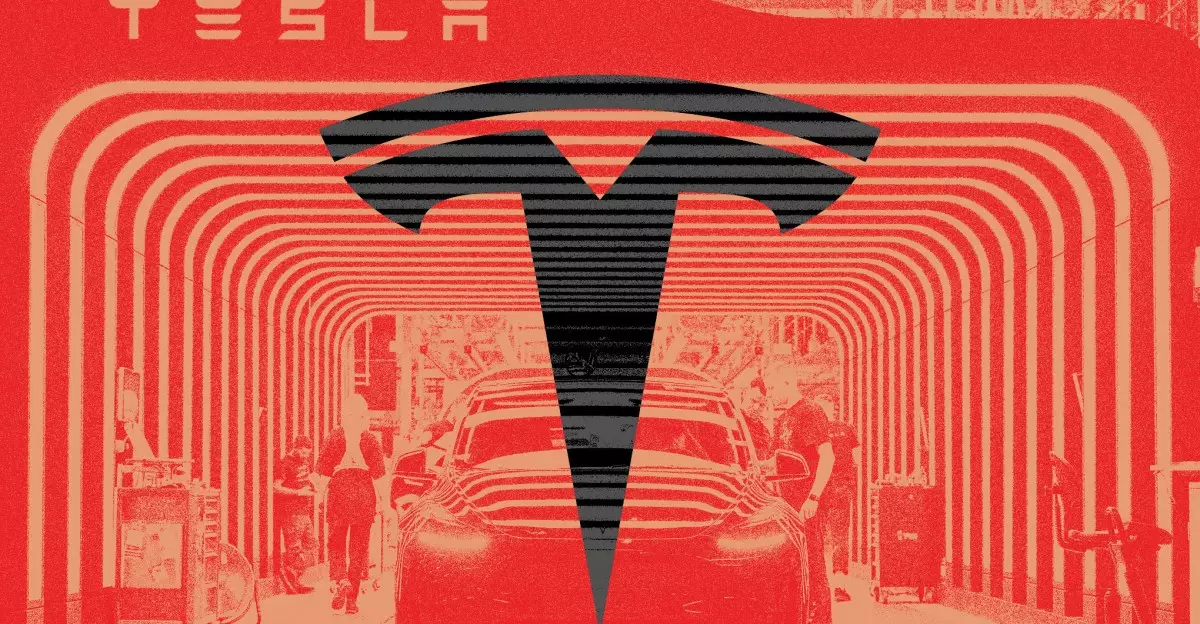In the labyrinth of the automotive market, few brands have captured public imagination like Tesla. The recent statistics, however, tell a different tale—a dramatic drop in sales in Europe by nearly 50 percent. This steep decline is not merely a fleeting phase; rather, it signals a deeper crisis that could redefine Tesla’s presence in one of its most sought-after markets. Such figures prompt a reflection on what could have gone wrong in a climate where electric vehicle (EV) popularity continues to burgeon.
In April 2025, the European Automobile Manufacturers Association revealed that Tesla registered only 7,261 new vehicles, a stark comparison to the 14,186 registrations noted in April 2024. While this drop is alarming, it’s critical to examine it in the broader context of the EV landscape, which has seen a vigorous 26.4 percent growth overall in the same period. Thus, the essence of Tesla’s plummeting sales is not merely due to a waning interest in electric vehicles, but hints at inadequacies on the company’s part in adapting to an evolving market.
The Competitive Landscape Shifts
One undeniable contributor to Tesla’s predicament is the influx of competitors in the automobile sector. Domestic manufacturers and aggressive Chinese rivals, equipped with innovative technology and alternative marketing strategies, are redefining customer expectations. Tesla’s position as a pioneer has been jolted, underscoring the volatile nature of public loyalty in the face of rising competition. The arrival of effective EV models from brands traditionally not known for electric technology has spurred consumer curiosity and better options, leading many to reconsider their brand affiliations.
At a time when consumer choice in the EV arena is exploding, Tesla’s inability to connect meaningfully with strategic upgrades and add-on services is concerning. The refresh of the Model Y was anticipated to rejuvenate interest; however, predictions of soaring sales have fizzled out, exemplifying a failure not just in execution, but in understanding consumer sentiment.
Elon Musk: The Double-Edged Sword
The gravitational pull of Elon Musk as a brand ambassador has served Tesla well in various capacities, yet it appears this relationship may have soured. Musk’s political engagements, particularly his apparent alliance with Germany’s far-right party, have ignited skepticism among a European audience that typically values progressive approaches to governance and corporate responsibility. This has led to adverse public sentiments fueling a brand crisis.
Surveys portray an escalating discontent with Musk, as evidenced by a Reuters/Ipsos poll revealing that a notable 58 percent of respondents held an unfavorable view of him. Contrast this with Tesla’s rankings in reputation, plunging from a respectable 8th spot to a concerning 95th. The once-clear association between Musk’s innovative allure and Tesla’s identity seems to be fraying, leading to a grim realization that attachment to a singular figure might not sustain corporate momentum in turbulent waters.
The Broader Implications for Tesla
The repercussions of such crises extend beyond mere sales figures; they touch upon the brand’s long-term viability and market positioning. With Tesla’s current trajectory appearing uncertain, stakeholders are left to ponder how a company that once spearheaded the EV revolution could find itself struggling for ground. Growth demands an agility that Tesla has yet to truly embody amid this shifting paradigm.
Elon Musk’s focus on diversifying into AI and robotics brings with it a distinct concern of neglecting core automotive responsibilities at a critical junction. As the market burgeons with enthusiasm for electric mobility, the future might not favor those who rest on past laurels. Instead, Tesla must recalibrate its strategies, addressing not only product innovation but also restoring its fractured public image.
In essence, these dilemmas send ripples across the entirety of Tesla’s operations. If the company hopes to shield itself from further declines, it must swiftly adapt, transforming this glaring fallout into a catalyst for realignment with consumer values and expectations. The stakes have never been higher, and whether Tesla can rebuff this downward trend will be a critical determinant of its future in both Europe and the global market.

